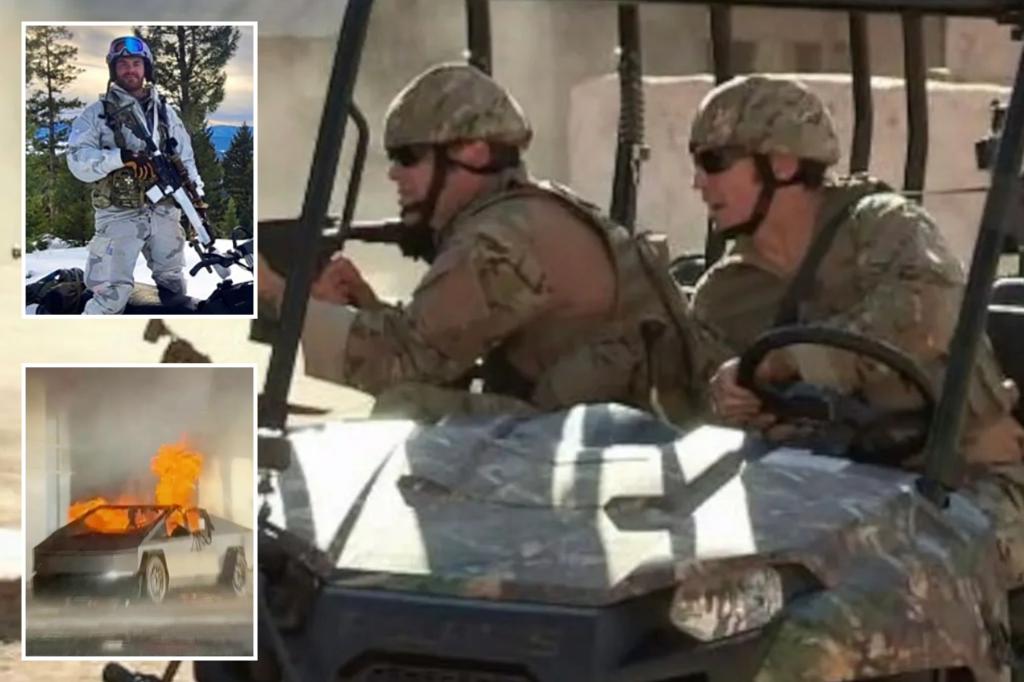Matthew Livelsberger, the individual responsible for the New Year’s Day Tesla Cybertruck bombing outside Trump International Hotel in Las Vegas, had a past that intertwined military service, reality television, and personal struggles. Over a decade before the incident that claimed his life, Livelsberger, using the nickname “Matt Berg,” appeared on the History Channel’s “Ultimate Soldier Challenge.” The episode, airing in 2013, featured a mock operation replicating SEAL Team Six’s raid on Osama Bin Laden. Partnered with Tim Kennedy, a fellow Green Beret and MMA fighter, Livelsberger showcased his military skills and competitive spirit, ultimately winning the challenge. This glimpse into his past paints a picture of a skilled and dedicated soldier, a stark contrast to the tragic events that would unfold years later.
Kennedy, reflecting on his experience with Livelsberger on the show, described him as “sincere, hard-working and talented,” expressing shock and heartbreak upon learning of his involvement in the bombing. He recalled Livelsberger’s proficiency with weapons and his emphasis on teamwork, traits evident in the episode where Livelsberger boasted about his ability to handle any firearm and stressed the importance of mutual support in combat. The contrast between the driven, collaborative soldier depicted on the show and the individual who ultimately resorted to violence underscores the complexity of Livelsberger’s story.
The “Ultimate Soldier Challenge” episode offered a window into Livelsberger’s military mindset. He displayed a deep respect for his fellow soldiers, both past and present, echoing sentiments he would later express in a suicide note found on his phone after the bombing. This note, referencing the “brothers” he had lost and the burden of lives taken, hinted at the internal struggles that may have contributed to his drastic actions. The episode also revealed a vulnerability, as Livelsberger required medical attention for heat exhaustion during filming, a brief glimpse of the man behind the soldier’s facade.
The events leading up to the bombing reveal a personal life unraveling. Livelsberger left his Colorado Springs home after a marital dispute sparked by his wife’s discovery of infidelity. He rented the Cybertruck through the Turo app, loaded it with explosives and fireworks, and parked it at the Trump International Hotel before taking his own life. His actions, while tragic and destructive, were seemingly motivated by a desire to draw attention to what he perceived as failures in American leadership.
In notes recovered by investigators, Livelsberger explained his motivations, denying any terrorist intent and instead framing his actions as a wake-up call to the nation. He criticized the country’s leadership, expressing disillusionment and a belief that the United States was on a path to collapse. This perceived decline, coupled with personal struggles and possible unresolved trauma from his military service, appears to have culminated in the desperate act of self-destruction and public spectacle.
Livelsberger’s military career spanned nearly two decades, including deployments to Afghanistan in 2017 and 2018. He joined the Green Berets in 2006, transitioning between active duty, National Guard, and Army Reserve service. His LinkedIn profile and ATF records confirm his dedication to the military, further complicating the narrative of a man who ultimately chose violence. His described persona as a “Rambo-type patriot” and staunch supporter of Donald Trump adds another layer to the complex portrait of a troubled individual struggling with personal demons and disillusionment. The bombing incident, while undeniably tragic, serves as a reminder of the unseen struggles faced by many, particularly those with military backgrounds, and the potential consequences of unresolved trauma and societal pressures.

